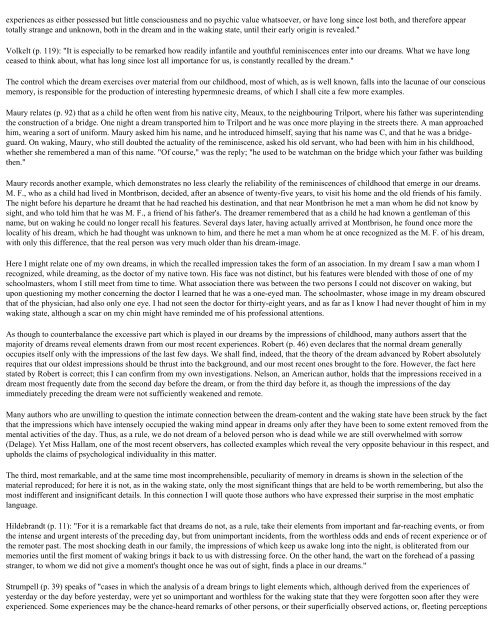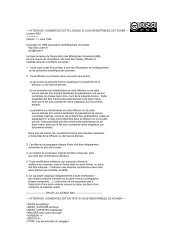The Interpretation of Dreams Sigmund Freud (1900)
The Interpretation of Dreams Sigmund Freud (1900)
The Interpretation of Dreams Sigmund Freud (1900)
You also want an ePaper? Increase the reach of your titles
YUMPU automatically turns print PDFs into web optimized ePapers that Google loves.
experiences as either possessed but little consciousness and no psychic value whatsoever, or have long since lost both, and therefore appear<br />
totally strange and unknown, both in the dream and in the waking state, until their early origin is revealed."<br />
Volkelt (p. 119): "It is especially to be remarked how readily infantile and youthful reminiscences enter into our dreams. What we have long<br />
ceased to think about, what has long since lost all importance for us, is constantly recalled by the dream."<br />
<strong>The</strong> control which the dream exercises over material from our childhood, most <strong>of</strong> which, as is well known, falls into the lacunae <strong>of</strong> our conscious<br />
memory, is responsible for the production <strong>of</strong> interesting hypermnesic dreams, <strong>of</strong> which I shall cite a few more examples.<br />
Maury relates (p. 92) that as a child he <strong>of</strong>ten went from his native city, Meaux, to the neighbouring Trilport, where his father was superintending<br />
the construction <strong>of</strong> a bridge. One night a dream transported him to Trilport and he was once more playing in the streets there. A man approached<br />
him, wearing a sort <strong>of</strong> uniform. Maury asked him his name, and he introduced himself, saying that his name was C, and that he was a bridgeguard.<br />
On waking, Maury, who still doubted the actuality <strong>of</strong> the reminiscence, asked his old servant, who had been with him in his childhood,<br />
whether she remembered a man <strong>of</strong> this name. "Of course," was the reply; "he used to be watchman on the bridge which your father was building<br />
then."<br />
Maury records another example, which demonstrates no less clearly the reliability <strong>of</strong> the reminiscences <strong>of</strong> childhood that emerge in our dreams.<br />
M. F., who as a child had lived in Montbrison, decided, after an absence <strong>of</strong> twenty-five years, to visit his home and the old friends <strong>of</strong> his family.<br />
<strong>The</strong> night before his departure he dreamt that he had reached his destination, and that near Montbrison he met a man whom he did not know by<br />
sight, and who told him that he was M. F., a friend <strong>of</strong> his father's. <strong>The</strong> dreamer remembered that as a child he had known a gentleman <strong>of</strong> this<br />
name, but on waking he could no longer recall his features. Several days later, having actually arrived at Montbrison, he found once more the<br />
locality <strong>of</strong> his dream, which he had thought was unknown to him, and there he met a man whom he at once recognized as the M. F. <strong>of</strong> his dream,<br />
with only this difference, that the real person was very much older than his dream-image.<br />
Here I might relate one <strong>of</strong> my own dreams, in which the recalled impression takes the form <strong>of</strong> an association. In my dream I saw a man whom I<br />
recognized, while dreaming, as the doctor <strong>of</strong> my native town. His face was not distinct, but his features were blended with those <strong>of</strong> one <strong>of</strong> my<br />
schoolmasters, whom I still meet from time to time. What association there was between the two persons I could not discover on waking, but<br />
upon questioning my mother concerning the doctor I learned that he was a one-eyed man. <strong>The</strong> schoolmaster, whose image in my dream obscured<br />
that <strong>of</strong> the physician, had also only one eye. I had not seen the doctor for thirty-eight years, and as far as I know I had never thought <strong>of</strong> him in my<br />
waking state, although a scar on my chin might have reminded me <strong>of</strong> his pr<strong>of</strong>essional attentions.<br />
As though to counterbalance the excessive part which is played in our dreams by the impressions <strong>of</strong> childhood, many authors assert that the<br />
majority <strong>of</strong> dreams reveal elements drawn from our most recent experiences. Robert (p. 46) even declares that the normal dream generally<br />
occupies itself only with the impressions <strong>of</strong> the last few days. We shall find, indeed, that the theory <strong>of</strong> the dream advanced by Robert absolutely<br />
requires that our oldest impressions should be thrust into the background, and our most recent ones brought to the fore. However, the fact here<br />
stated by Robert is correct; this I can confirm from my own investigations. Nelson, an American author, holds that the impressions received in a<br />
dream most frequently date from the second day before the dream, or from the third day before it, as though the impressions <strong>of</strong> the day<br />
immediately preceding the dream were not sufficiently weakened and remote.<br />
Many authors who are unwilling to question the intimate connection between the dream-content and the waking state have been struck by the fact<br />
that the impressions which have intensely occupied the waking mind appear in dreams only after they have been to some extent removed from the<br />
mental activities <strong>of</strong> the day. Thus, as a rule, we do not dream <strong>of</strong> a beloved person who is dead while we are still overwhelmed with sorrow<br />
(Delage). Yet Miss Hallam, one <strong>of</strong> the most recent observers, has collected examples which reveal the very opposite behaviour in this respect, and<br />
upholds the claims <strong>of</strong> psychological individuality in this matter.<br />
<strong>The</strong> third, most remarkable, and at the same time most incomprehensible, peculiarity <strong>of</strong> memory in dreams is shown in the selection <strong>of</strong> the<br />
material reproduced; for here it is not, as in the waking state, only the most significant things that are held to be worth remembering, but also the<br />
most indifferent and insignificant details. In this connection I will quote those authors who have expressed their surprise in the most emphatic<br />
language.<br />
Hildebrandt (p. 11): "For it is a remarkable fact that dreams do not, as a rule, take their elements from important and far-reaching events, or from<br />
the intense and urgent interests <strong>of</strong> the preceding day, but from unimportant incidents, from the worthless odds and ends <strong>of</strong> recent experience or <strong>of</strong><br />
the remoter past. <strong>The</strong> most shocking death in our family, the impressions <strong>of</strong> which keep us awake long into the night, is obliterated from our<br />
memories until the first moment <strong>of</strong> waking brings it back to us with distressing force. On the other hand, the wart on the forehead <strong>of</strong> a passing<br />
stranger, to whom we did not give a moment's thought once he was out <strong>of</strong> sight, finds a place in our dreams."<br />
Strumpell (p. 39) speaks <strong>of</strong> "cases in which the analysis <strong>of</strong> a dream brings to light elements which, although derived from the experiences <strong>of</strong><br />
yesterday or the day before yesterday, were yet so unimportant and worthless for the waking state that they were forgotten soon after they were<br />
experienced. Some experiences may be the chance-heard remarks <strong>of</strong> other persons, or their superficially observed actions, or, fleeting perceptions









